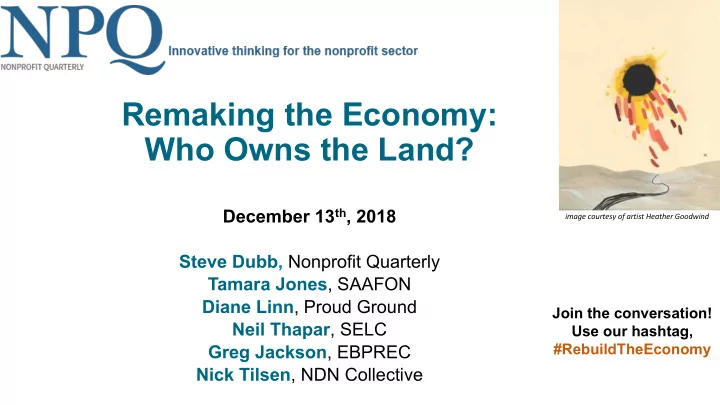

Remaking the Economy: Who Owns the Land? December 13 th , 2018 image courtesy of artist Heather Goodwind Steve Dubb, Nonprofit Quarterly Tamara Jones , SAAFON Diane Linn , Proud Ground Join the conversation! Neil Thapar , SELC Use our hashtag, #RebuildTheEconomy Greg Jackson , EBPREC Nick Tilsen , NDN Collective
Who Owns the Land? US Home Ownership, 2016 Top 1% 10.7 percent Bottom 90% Next 9% 58.7 percent 30.6 percent Source: Ed Wolff, National Bureau of Economic Research working paper 24085, Nov. 2017
Who Owns the Land? US Non-Home Real Estate, 2016 Bottom 90% Top 1% 17.9 percent 40 percent Next 9% 42.1 percent Source: Ed Wolff, National Bureau of Economic Research working paper 24085, Nov. 2017
Community Land Strategies • Land banking • Resident-owned communities (manufactured housing) • Limited-equity housing cooperatives • Land recovery in communities of color • Community land trusts • Agrarian trusts • Permanent real estate cooperatives
Series Overview Community Land Worker Remaking the Ownership Economy Ownership 12-13-2018 1-10-2019 11-8-2018 Community Leveraging Building Policy Capital & Finance “Eds & Meds” Agendas 2-14-2019 3-14-2019 4-11-2019 How to Succeed at Changing the System 5-9-2019
Series Learning Objectives • Clarify core principles • Develop a toolkit • Understand ecosystems • Identify ways to decolonize wealth and foster racial equity • Highlight points of leverage • Foster shifts in practice and thinking • Balance short-term goals with long-term vision
“For a colonized people the most essential value, because the most concrete, is first and foremost the land: the land which will bring them bread and, above all, dignity.” -- Frantz Fanon
1920 16 million acres of farmland Black-owned Today 3 million acres of farmland Black-owned 1920 14% of all farms Black-owned Today 1% of all farms Black-owned Individual land ownership resulted in increased vulnerability to land loss • Systemic discrimination by the US government ( Pigford lawsuit) • Heirs property & “partition sales” • Other real estate predatory speculation • Predatory financing and foreclosures by banks • Lack of capital to pay taxes and liens • Limited access to credit • Stolen by greedy and/or racist neighbors
New Communities Inc. New Communities Inc • Founded by Charles & Shirley Sherrod • First community land trust in the United States • To protect and secure the homes and lands of the southern rural poor • To establish a means for rural economic development through agricultural, mechanical, educational, and social service opportunities
• Self determination • Sovereignty • Collectivism • Deep democracy • Intergenerational • Community Wealth and Power to shift economic control • Reparations • Radical ecology • Radical inclusivity Key Principles & Values • Radical Black Feminism
BLACK LAND AND POWER COALITION
• Proud Ground creates permanently affordable homeownership opportunities for first-time homebuyers using the Community Land Trust model. • Founded in 1999, Proud Ground became the first city-wide entity to provide permanently affordable homeownership opportunities and since has expanded to five counties around the state—to better meet the needs of working families. • Proud Ground has become one of the largest community land trusts in the country, having served 363 families in a permanently affordable portfolio of 287 homes.
The Homeownership Process
The CLT Model Limits the Rate of Increase in Resale Prices, Keeping Homes Affordable Over Time Market One-time subsidy price Resale price remains affordable without any new subsidy Affordable price Price Source: Rick Jacobus Time
Demographics • 52% Proud Ground homeowners of color served in total • 71% Proud Ground homeowners of color served in 2017 • 75% Proud Ground homeowners of color served by 2020 New Funding Sources • Inclusionary Housing • OHCS’ Local Innovation Fast Track (LIFT) • Metro Bond
Community Ownership of Land • Uses a land lease to hold the land in the community trust deed restriction • Focus on permanent affordability and protecting homes/units from the market • Community engagement includes tripartite Board of Directors and membership benefits
One of many solutions: Agrarian Trust Support land access for the next generation of farmers. Inspirations: - Bhoodan Movement - New Communities Inc. - Terre de Liens
Governance and Structure Polycentricity (many centers of power) Stakeholder membership & decision-making Staff trusteeship Non-speculative land ownership Racial Equity
Financing/Capital Operations Land Acquisition Farm Infrastructure Philanthropy Philanthropy Philanthropy Individual donations Individual donations Individual donations + + Land donations / bargain Land donations / bargain sales sales + Patient impact investment Community capital
EB EB P PREC M Missio ission P n Pillar illars #HealPeoplePower #RestorativeEconomics #LandWithoutLandlords Democratic governance Building collective wealth Housing as a right, not a to short-circuit learned among historically Commodity colonial power practices, disenfranchised communities rebuild our capacity to heal, and reimagine Collective Power
Conventional Real Co Estate Es Fund and Own Landlord Purchase & Manage Bank Equity & Interest/Profit Profit Properties We The People Tenants Pay Rent Are the
How EBPREC is Reimagining Real Re East Bay Estate Purchase & PREC Fund, Manage Manage and Own We The Return on Investments and Profits Properties People Equity Are the Pay Rent, Live Tenants in, and Manage
Cultivating a new legal landscape that supports community resilience and grassroots economic empowerment.
Th Thank y you f for jo join inin ing us! s! Nonprofit Quarterly relies on your generous support. If you enjoyed this webinar, please consider donating today! https://nonprofitquarterly.networkforgood.com/ Tell us what you thought! Use our special hashtag, #Re RebuildTheEconomy image courtesy of artist Heather Goodwind
Recommend
More recommend